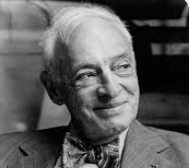
Saul Bellow — The Novelist of Consciousness, Dignity, and Modern Disillusion (1915–2005)
Saul Bellow was the great anatomist of modern inner life — a writer who believed that even in an age of noise, bureaucracy, and spiritual exhaustion, the individual mind still mattered. His novels pulse with intelligence, irony, and moral urgency, insisting that human dignity survives even when the world seems determined to grind it down. Bellow made thinking itself dramatic.
An Immigrant’s Inheritance
Born in Quebec to Russian Jewish immigrants and raised in Chicago, Bellow grew up between languages, cultures, and expectations. This outsider position shaped his lifelong sensitivity to displacement, aspiration, and the tension between belonging and independence.
Chicago — restless, brash, intellectually hungry — became a formative landscape. It grounded Bellow’s work in the concrete realities of American life while keeping him alert to its spiritual hollowness. He never romanticized poverty or exile, but he never forgot what it taught him about resilience and wit.
“I am an American, Chicago born.”
The Intellectual as Protagonist
Bellow broke decisively with the idea that serious thought and compelling fiction were incompatible. His protagonists — Moses Herzog, Augie March, Charlie Citrine — are intellectuals not in ivory towers, but in the thick of emotional chaos, failed marriages, public humiliations, and moral confusion.
They think obsessively, argue with the dead, quote philosophers mid-breakdown, and search for meaning amid absurdity. Bellow made inner monologue muscular, turning reflection into action and thought into narrative momentum.
“You never know what you’re going to need to know.”
The Adventure of Augie March
The Adventures of Augie March announced Bellow’s mature voice — exuberant, expansive, unapologetically American. Augie is a drifter, a seeker, refusing to be pinned down by ideology, class, or fate.
The novel rejected both grim naturalism and tidy moral lessons. Life, Bellow suggested, is an open-ended improvisation — comic, painful, and saturated with possibility. Style itself became an argument for freedom.
“I am an American, Chicago born — Chicago, that somber city.”
Herzog — Thought as Breakdown
In Herzog, Bellow produced one of the defining novels of the twentieth century. Moses Herzog writes unsent letters — to philosophers, politicians, friends, enemies, and the dead — as his life collapses around him.
What might seem like madness becomes an indictment of modern life. Herzog’s intellectual excess reflects a culture drowning in explanations but starved of wisdom. The novel asks whether clarity of mind can survive emotional devastation — and whether sanity itself has become a fragile achievement.
“When I say ‘I,’ I mean a creature of history.”
Against Reduction and Cynicism
Bellow resisted the dominant reductionisms of his age. He rejected the idea that human beings are merely psychological mechanisms, social constructs, or economic units.
His work insists on the irreducibility of the soul — not in a religiously dogmatic sense, but as a lived reality: conscience, longing, dignity, and moral struggle. Even at his most satirical, Bellow refused nihilism.
Irony, for him, was a tool of survival, not an excuse for despair.
Fame, Conflict, and the Public Intellectual
Bellow became a literary institution — winning the Nobel Prize in Literature in 1976 and shaping generations of writers. Yet his success brought controversy. His bluntness, political skepticism, and refusal to flatter fashionable opinions often placed him at odds with cultural elites.
He accepted this friction. Literature, he believed, was not therapy or propaganda, but a confrontation with reality as it is — messy, tragic, and sometimes ridiculous.
Legacy — The Novelist Who Defended the Inner Life
Saul Bellow’s legacy lies in his defense of the thinking individual in an age hostile to depth. He showed that intelligence could be passionate, that seriousness could be funny, and that literature could still grapple with the largest human questions without surrendering to abstraction.
His novels affirm that consciousness itself is an adventure — risky, exhausting, and indispensable. In preserving the dignity of thought, Bellow preserved the dignity of the person.
“People can lose their lives in libraries. They ought to be warned.”
CivilSimian.com created by AxiomaticPanic, CivilSimian, Kalokagathia
